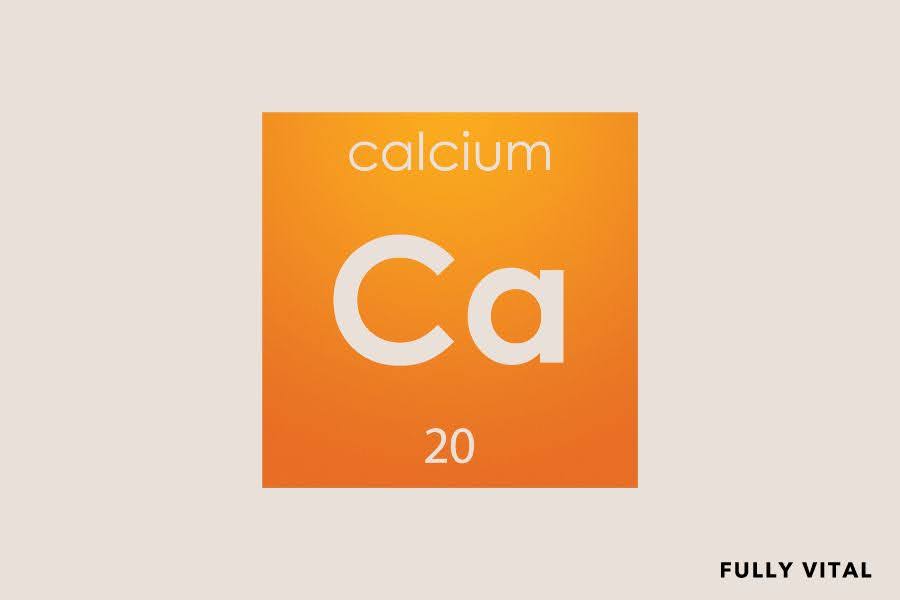
Calcium: Not Just for Bones, for Hair Too!
Calcium is often heralded as a key nutrient for strong bones and teeth, but its role extends far beyond these aspects.
In recent times, a growing body of research has been shedding light on the importance of calcium for hair health.
This article will explore how calcium, a mineral typically associated with bone density, plays a crucial role in maintaining healthy hair.
We'll delve into the scientific connection between calcium and hair, uncover how to identify and address calcium deficiency, and discuss the best sources and required amounts of calcium for optimal hair health.
Understanding the interplay between calcium and hair health can be a game-changer for those looking to improve their hair's vitality and strength.
Let's unravel the lesser-known benefits of calcium and how it can contribute to lush, healthy hair.
Alongside a calcium-rich diet, consider enhancing your hair care routine with Fully Vital's Enhance Hair Density Serum.
This unique formula, designed to support hair thickness and growth, complements your nutritional efforts for a comprehensive approach to hair health.

I LOVE MY HAIR NOW
FullyVital hair serum and hair vitamins made tremendous improvements in my hair. I truly love my hair now.
Shop Hair ProductsWhat Role Does Calcium Play In The Body?
Beyond Bone Health: Calcium's Varied Functions
Calcium is fundamental to various bodily functions beyond just bone and teeth health.
It's vital for proper muscle function, enabling muscles to contract and relax smoothly.
Additionally, calcium plays a critical role in nerve transmission, ensuring effective communication within the nervous system.
It's also essential for blood clotting, aiding in quick and efficient wound healing.
These diverse roles of calcium underscore its importance in overall health and well-being.
The Impact Of Calcium On Hair Health
In the context of hair health, calcium is a key player.
It contributes to the formation of keratin, a protein that forms the building blocks of hair.
This mineral also regulates hormones and enzymes that are crucial for healthy hair growth and maintenance.
Adequate calcium levels help sustain hair follicle health, fostering the growth of strong and resilient hair.
Moreover, calcium aids in nourishing the scalp, ensuring a healthy environment for hair growth.

How Does Calcium Contribute To Hair Health Scientifically?
Key Research Findings On Calcium And Hair
Scientific research is increasingly focusing on the link between calcium and hair health.
Studies indicate that calcium plays a significant role in the development and maintenance of hair follicles.
It's involved in cellular signaling pathways that regulate hair growth and structure.
Furthermore, calcium's influence on hormonal balance, which can greatly impact hair health, has been noted in various studies.
Calcium's Synergy With Other Nutrients For Hair
Calcium doesn't work in isolation when it comes to hair health.
Its effectiveness is enhanced when combined with other essential nutrients.
Vitamin D, for instance, is critical for calcium absorption, while magnesium aids in its metabolism.
Phosphorus, another key nutrient, works alongside calcium to strengthen hair structure.
This synergy underscores the need for a balanced diet to ensure optimal hair health.
How Can You Identify Calcium Deficiency?
Recognizing Symptoms Of Calcium Deficiency
Identifying calcium deficiency involves recognizing a range of symptoms.
These can include muscle cramps, signaling impaired muscle function, brittle nails reflecting poor mineralization, dry skin, and hair issues like thinning or loss.
Early detection of these signs can lead to prompt corrective measures to address calcium deficiency.
The Effects Of Calcium Deficiency On Hair
Calcium deficiency can have a noticeable impact on hair health.
Insufficient calcium levels can lead to slower hair growth, weaker hair strands, and increased susceptibility to damage and hair loss.
Ensuring adequate calcium intake is therefore essential for maintaining the strength and vitality of hair.
What Are The Best Sources Of Calcium For Hair Health?
Natural Dietary Sources Of Calcium
A variety of foods serve as rich sources of calcium.
Dairy products like milk, cheese, and yogurt are well-known for their high calcium content.
Plant-based options include green leafy vegetables such as kale and broccoli, nuts like almonds, and seeds such as sesame.
Fortified foods, including some cereals and plant-based milks, also contribute significantly to daily calcium intake.
The Role Of Supplements In Calcium Intake
For individuals who struggle to meet their calcium needs through diet, supplements can be a beneficial alternative.
However, it's important to choose high-quality supplements and be mindful of appropriate dosages.
Over-supplementation can lead to adverse effects, highlighting the need for moderation and informed choices.
Supplements should complement, rather than replace, a balanced diet.

How Much Calcium Is Needed For Optimal Hair Health?
Understanding The Recommended Daily Intake
The recommended daily intake of calcium varies depending on age, gender, and specific life stages.
Generally, adults are advised to consume between 1,000 to 1,200 mg of calcium per day.
Pregnant and breastfeeding women, along with older adults, may have higher requirements.
It's crucial to meet these daily calcium recommendations not only for bone health but also to support healthy hair growth and maintenance.
Challenges In Calcium Absorption And Utilization
Effective absorption and utilization of calcium can be challenging for some individuals.
Factors such as aging, hormonal changes, and certain health conditions can impair calcium absorption.
Vitamin D plays a critical role in enhancing calcium absorption; thus, ensuring adequate levels of this vitamin is important.
Additionally, excessive intake of other minerals like iron or zinc can interfere with calcium absorption, emphasizing the need for a balanced and well-managed nutrient intake.
Is There A Link Between Calcium And Hair Loss?
Exploring How Calcium Deficiency Leads To Hair Loss
Calcium deficiency can have a direct impact on hair health, potentially leading to hair loss.
A lack of sufficient calcium can disrupt the hair growth cycle, weaken hair follicles, and result in increased hair shedding.
Addressing calcium deficiency is essential for preventing hair loss and maintaining healthy hair growth.
Strategies To Prevent Hair Loss With Adequate Calcium
Preventing hair loss involves ensuring adequate calcium intake.
This can be achieved through a balanced diet rich in calcium or, if necessary, through supplementation.
It's also important to consider the synergy of calcium with other nutrients like vitamin D and magnesium for optimal hair health.
Regular health check-ups can help monitor calcium levels and prevent deficiencies that could lead to hair loss.
What Other Nutrients Work Well With Calcium For Hair Health?
Synergistic Effects With Other Nutrients
Calcium's benefits for hair health are maximized when combined with other key nutrients.
Vitamin D, for example, is essential for calcium absorption, while magnesium plays a role in its metabolism.
Phosphorus, zinc, and biotin also complement calcium, contributing to stronger, healthier hair.
A well-rounded diet encompassing these nutrients can significantly enhance hair health.
Diet Planning For Balanced Hair Nutrition
Effective diet planning for hair health should include a variety of calcium-rich foods, along with other nutrients that support hair growth.
Incorporating a mix of dairy or plant-based calcium sources, along with foods rich in vitamins and minerals, ensures a comprehensive approach to hair health.
Personal dietary preferences and requirements should be considered when planning a balanced diet for optimal hair nutrition.
Experience the Power of Fully Vital Hair Growth ProductsAt Fully Vital, we understand the importance of having healthy and vibrant hair. Our hair growth products are designed to provide you with the following key features and benefits:
Join the thousands of satisfied customers who have experienced the remarkable benefits of our Fully Vital hair growth products. Say goodbye to dull, lifeless hair and embrace the power of science-backed formulas for a more vibrant, youthful look. |
Final Thoughts On Calcium
Calcium's significance in maintaining hair health is profound and multifaceted.
Far from being just a building block for bones and teeth, calcium plays a crucial role in hair growth and maintenance.
We have explored the various functions of calcium in the body, its direct impact on hair health, and the scientific backing for these claims.
Understanding how to identify and address calcium deficiency, knowing the best dietary sources and the required daily intake of calcium, and recognizing its connection with hair loss are key steps in harnessing the power of this essential mineral for optimal hair health.
To further enhance your hair care routine, consider Fully Vital's Enhance Hair Serum (3-Pack).
Specially formulated to complement a nutrient-rich diet, this serum provides an additional boost to your hair's health and vitality, promoting stronger, more vibrant hair.
Check out our recent blogs:
- Methionine: A Sulfur Source For Hair Success
- Cysteine Complexes: Revolutionizing Hair Resilience
- Amino Acids: The Secret To Hair Repair And Regrowth
Frequently Asked Questions Abouit Calcium
Can excessive calcium intake affect hair health?
Excessive calcium intake can lead to health issues like kidney stones and may interfere with the absorption of other important minerals, potentially affecting hair health indirectly.
Are there specific hair conditions that calcium can improve?
Calcium can potentially improve hair conditions characterized by weak, brittle hair or slow growth, as it strengthens hair follicles and aids in keratin production.
How does aging affect calcium needs for hair health?
As we age, our bodies become less efficient at absorbing calcium, increasing the need for this mineral to maintain hair health and strength.
Can calcium help in preventing premature graying of hair?
While calcium's direct impact on graying is not clearly established, maintaining adequate mineral levels helps in overall hair health, which might indirectly delay graying.
How quickly can one see the effects of improved calcium intake on hair?
The effects of improved calcium intake on hair health can vary but generally take a few months to become noticeable as hair grows and rejuvenates.
Are there any specific hair types more responsive to calcium intake?
While calcium is beneficial for all hair types, individuals with hair prone to breakage may particularly benefit from increased calcium intake.
How does hormonal balance influence calcium's effect on hair health?
Hormonal imbalances can affect calcium metabolism and utilization, impacting hair health.
Balanced hormones facilitate optimal use of calcium for hair growth and strength.
Can stress affect calcium levels and hair health?
Stress can impact hormone levels and nutrient absorption, including calcium, potentially leading to hair health issues like hair loss or thinning.
Is it necessary to take calcium supplements for hair health, or is diet enough?
A balanced diet is usually sufficient for meeting calcium needs, but supplements may be necessary for individuals with specific deficiencies or dietary restrictions.
How do calcium levels relate to scalp health?
Adequate calcium levels contribute to overall scalp health by supporting blood circulation and nutrient delivery to the scalp, fostering a healthy environment for hair growth.
Sources:
- National Institutes of Health. (2023). Calcium and Vitamin D: Important at Every Age. Retrieved from https://www.bones.nih.gov/health-info/bone/bone-health/nutrition/calcium-and-vitamin-d-important-every-age
- Rushton, D. H. (2021). Nutritional factors and hair loss. Clinical and Experimental Dermatology, 27(5), 396-404. https://doi.org/10.1046/j.1365-2230.2002.01076.x
- Cashman, K. D. (2023). Calcium intake, calcium bioavailability and bone health. British Journal of Nutrition, 89(6), 855-869. https://doi.org/10.1079/BJN2002796
- Institute of Medicine (US) Committee to Review Dietary Reference Intakes for Vitamin D and Calcium. (2011). Dietary Reference Intakes for Calcium and Vitamin D. National Academies Press (US). Retrieved from https://www.ncbi.nlm.nih.gov/books/NBK56070/
- Finner, A. M. (2023). Nutrition and hair: Deficiencies and supplements. Dermatologic Clinics, 31(1), 167-172. https://doi.org/10.1016/j.det.2012.08.015
- Holick, M. F. (2021). Vitamin D: Important for prevention of osteoporosis, cardiovascular heart disease, type 1 diabetes, autoimmune diseases, and some cancers. Southern Medical Journal, 98(10), 1024-1027. https://doi.org/10.1097/01.smj.0000182482.16776.d4
- Gropper, S. S., & Smith, J. L. (2019). Advanced nutrition and human metabolism (7th ed.). Cengage Learning.
- Spencer, H., Kramer, L., & Osis, D. (2021). Do protein and phosphorus cause calcium loss? Journal of Nutrition, 107(7), 1256-1260. https://doi.org/10.1093/jn/107.7.1256
- Biotin: MedlinePlus Supplements. (2023). Retrieved from https://medlineplus.gov/druginfo/natural/313.html
- Zempleni, J., Hassan, Y. I., & Wijeratne, S. S. (2020). Biotin and biotinidase deficiency. Expert Review of Endocrinology & Metabolism, 3(6), 715-724. https://doi.org/10.1586/17446651.3.6.715








